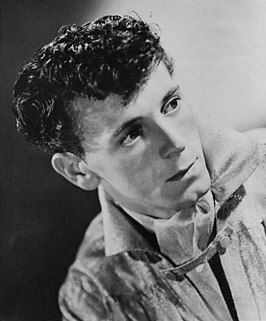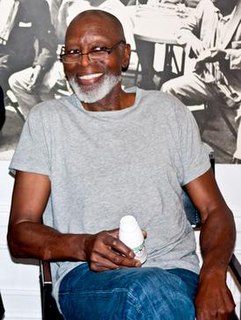
Vincent Eugene Craddock, known as Gene Vincent, was an American musician who pioneered the styles of rock and roll and rockabilly. His 1956 top ten hit with his Blue Caps, "Be-Bop-a-Lula", is considered a significant early example of rockabilly. He was inducted into the Rock and Roll Hall of Fame and the Rockabilly Hall of Fame. He is sometimes referred to by his somewhat unusual nickname/moniker the "Screaming End".

Liberty Records was a record label founded in the United States by chairman Simon Waronker in 1955 with Al Bennett as president and Theodore Keep as chief engineer. It was reactivated in 2001 in the United Kingdom and had two previous revivals.

The Brill Building is an office building at 1619 Broadway on 49th Street in the New York City borough of Manhattan, just north of Times Square and further uptown from the historic musical Tin Pan Alley neighborhood. It was built in 1931 as the Alan E. Lefcourt Building, after the son of its builder Abraham E. Lefcourt, and designed by Victor Bark Jr. The building is 11 stories high and has approximately 175,000 square feet (16,300 m2) of rentable area.

"Duke of Earl" is a 1962 US number-one song, originally recorded by Gene Chandler. It is the best known of Chandler's songs, and he subsequently dubbed himself "The Duke of Earl". The song was penned by Chandler, Bernice Williams, and Earl Edwards. This song was a 2002 inductee into the Grammy Hall of Fame. It has also been selected by The Rock and Roll Hall of Fame as one of the 500 Songs that Shaped Rock and Roll.

Headquarters is the third album issued by the Monkees and the first with substantial songwriting and instrumental performances by members of the group itself, rather than by session musicians and professional songwriters. After a struggle for creative autonomy with their record label, the group had been allowed, to a degree, to record by themselves. Headquarters reached No. 1 on the Billboard 200 chart and was certified double platinum in the United States with sales of more than two million copies within the first two months of release. It peaked at No. 2 on the UK charts. It is included in the 2006 book 1001 Albums You Must Hear Before You Die.
Jeff Barry is an American pop music songwriter, singer, and record producer. Among the most successful songs that he has co-written in his career are "Do Wah Diddy Diddy", "Da Doo Ron Ron", "Then He Kissed Me", "Be My Baby", "Chapel of Love", and "River Deep - Mountain High" ; "Leader of the Pack" ; "Sugar, Sugar" ; "Without Us".

Changes is the ninth studio album by the Monkees. The album was issued after Michael Nesmith's exit from the band, leaving only Micky Dolenz and Davy Jones to fulfill the recording contract they had signed in the mid-1960s. Changes was their last new album for Colgems Records and the group's last album of all new material until Pool It!, released in 1987.

"Sugar, Sugar" is a song written by Jeff Barry and Andy Kim. It was originally recorded by the cartoon band the Archies. This version reached No. 1 in the US on the Billboard Hot 100 chart in 1969 and remained there for four weeks. It also reached No. 1 on the UK Singles chart in that same year for eight weeks. The song became a hit again in 1970 when rhythm and blues and soul singer Wilson Pickett's version was listed on music charts.

The Name of the Game is an American television series starring Tony Franciosa, Gene Barry, and Robert Stack, which aired from 1968 to 1971 on NBC, totaling 76 episodes of 90 minutes each. The show was a wheel series, setting the stage for The Bold Ones and the NBC Mystery Movie in the 1970s. The program had the largest budget of any television series at that time.

"Do You Want to Dance" is a song written by American singer Bobby Freeman and recorded by him in 1958. It reached number No. 5 on the United States Billboard Top 100 Sides pop chart and No. 2 on the Billboard R&B chart. Cliff Richard and the Shadows' version of the song reached No. 2 in the United Kingdom in 1962, despite being a B-side. The Beach Boys' version reached No. 12 as "Do You Wanna Dance?" in the United States in 1965, and a 1972 cover by Bette Midler reached No. 17.

Eugene Booker McDaniels was an American singer and songwriter. He had his greatest recording success in the early 1960s, reaching number three on the U.S. Billboard Hot 100 singles chart with "A Hundred Pounds of Clay" and number five with "Tower Of Strength," both hits in 1961. He had continued success as a songwriter with titles including "Compared to What" and Roberta Flack's "Feel Like Makin' Love".
Albert Hazan was an American pop-rock recording artist, songwriter, and record producer.

Endless Love: Original Motion Picture Soundtrack is the soundtrack album to the film of the same name. The album was released worldwide by Mercury Records and PolyGram in 1981.
"Tower of Strength" is a song written by Burt Bacharach and Bob Hilliard and performed by Gene McDaniels. The record was produced by Snuff Garrett and featured the Johnny Mann Singers and Earl Palmer on drums. It appeared on his 1961 album, Tower of Strength.
"A Hundred Pounds of Clay" is a song written by Kay Rogers, Luther Dixon, and Bob Elgin and performed by Gene McDaniels. The song was produced by Snuff Garrett. Earl Palmer played drums on the song. The song appeared on McDaniels' 1961 album 100 Lbs. Of Clay!
Arthur Resnick is an American songwriter, record producer and musician. His most successful songs as a writer include "Under the Boardwalk", "Good Lovin'", and "Yummy Yummy Yummy".
Fred Sledge Smith, often credited as Fred Smith, was an American R&B songwriter and record producer, who worked in particular with The Olympics, Bob & Earl, Bill Cosby, and the Watts 103rd Street Rhythm Band.

Everybody Loves a Clown is the third studio album by American band Gary Lewis & the Playboys, and was released in 1965 on Liberty Records, LRP-3428. It is the third of three charting albums released by the band in 1965, and it was the band's third highest charting original album reaching number 44 on the Billboard 200. The single "Everybody Loves a Clown" was the band's fourth single in a row to chart on the Billboard Hot 100, reaching number 4 in November 1965.
"Send for Me" is a song written by Ollie Jones and performed by Nat King Cole featuring the McCoy's Boys. It reached No. 1 on the U.S. R&B chart and No. 6 on the U.S. pop chart in 1957. The song was arranged by Billy May.












